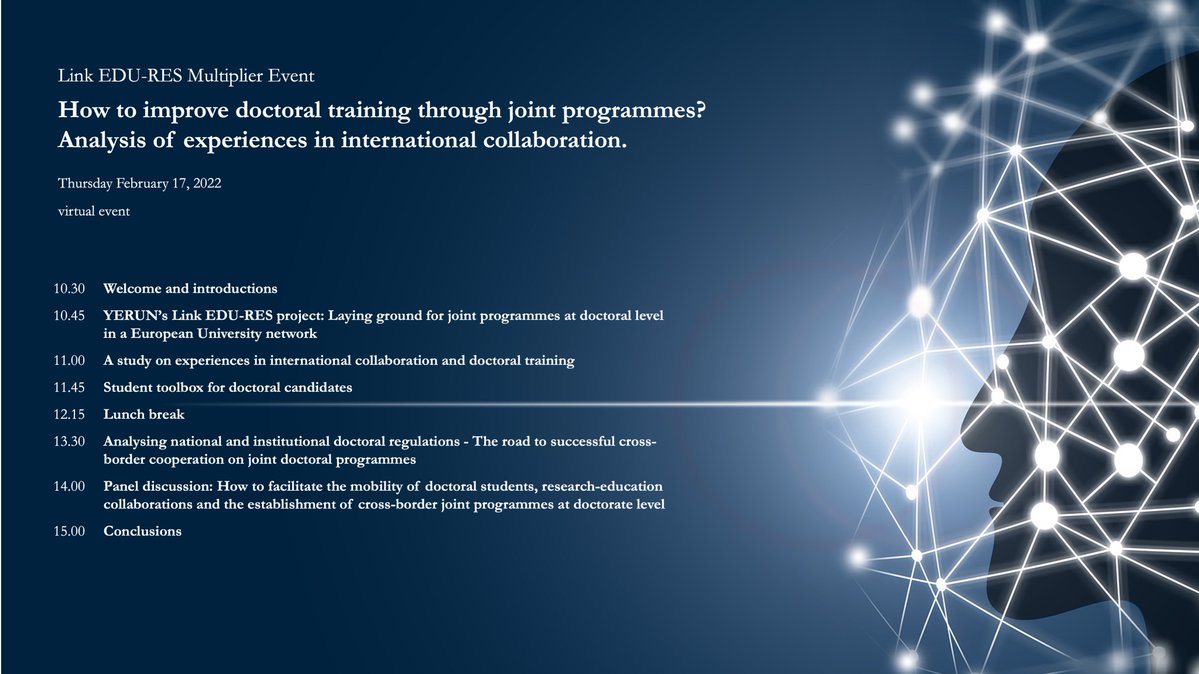On 17 February 2022, the Link EDU-RES project held its first multiplier event on “How to improve doctoral training through joint programmes? Analysis of experiences in international collaboration”.
The event, which brought together more than 70 participants from YERUN member universities and beyond, was opened by the YERUN Secretary General, Ms. Silvia Gomez Recio.
“I am proud of our members involved in this forward-looking project, which tackles one of key aspect in the implementation of the European University Alliances and in general, in university collaboration: how to facilitate the establishment of joint doctoral programmes. I am sure that the whole European higher education will benefit from its outcomes and recommendations” said Silvia.
Dr. Pieter Spooren, Head of the Research Affairs Office at the University of Antwerp, held a presentation on “YERUN’s Link EDU-RES project: Laying ground for joint programmes at doctoral level in a European University network”. Dr. Spooren presented the intellectual outputs of the project and presented the programme of the event.
Prof. dr. Marco Celentani from the University Carlos III de Madrid presented “A study on experiences in international collaboration and doctoral training”. He gave an overview of the results of a survey run in 2021 which involved 12 YERUN member institutions.
Prof. dr. Sanja Bahun, Melissa Brisley and Laura Ruddick from the University of Essex and Dr. Karen Brans from the University of Antwerp presented the Student toolbox for doctoral candidates.
The presentation of the Toolbox can be found here.
After the lunch break, Susanne Sivonen from Maastricht University presented “Analysing national and institutional doctoral regulations – The road to successful cross-border cooperation on joint doctoral programmes. Her presentation can be found here.
The last part of the event was dedicated to a panel discussion on the topic: “How to facilitate the mobility of doctoral students, research-education collaborations and the establishment of cross-border joint programmes at doctorate level”.
The discussion, moderated by Silvia Gomez, brought around the table: Dr. Corina Balaban from the University of Manchester and guest editor of a special issue on mobility in doctoral education in Learning and Teaching; Prof.dr. John Creemers from the university KU Leuven, chair of the Flemish interuniversity working group Doctoral Schools; Dr. Alexander Hasgall, head of the European University Association’s Council for Doctoral Education; Dr. Mostafa Moonir Shawrav chair of the Marie Curie Alumni Association; Dr. Danila Rijavec board member – treasurer and WG Mobility Coordinator of Eurodoc.
Panelists brought in many interesting perspectives on the topic of mobility in doctoral studies, each of which beautifully complemented the others. The recording of the panel discussion can be found here.
These are the main views brought forward by the panelists:
- There is no ‘one-size-fits-all” approach: we need to embed diversity and inclusive approaches when strategically planning mobilities in joint programmes. They should be offered to everyone but not everyone should be obliged to do it.
- At the same time, other aspects should be strongly encouraged, such as intersectoral and interregional mobility, which have the potential to produce more local impact. The timing of the mobility is important: it is not a sustainable lifestyle in the long-term for a majority (the need for stability in the individuals appears at some point).
- Mobilities have the potential to widen the skills set spectrum, which is highly relevant at the moment in terms of future employability. It also serves a purpose of building an international network.
- Institutional collaboration, through networks, alliances, and national and regional structures, enables a good understanding on the different conditions of educational programmes and paves the way to develop collaborative activities and joint programmes. They can be more or less formal, but in any case, the communication among institutions is essential to accompany students and doctoral candidates in their joint endeavour.
- Institutions that work on increasing their collaborations at doctoral level, despite the process being burdensome, they acquire also skills for internationalisation. Entering in this process increases their knowledge on other’s countries educational structures and regulations, which provide them a better understanding in partnership development. However, institutions need to remain flexible in the development of these partnerships and the efforts required to establish such collaborations should be taken into account.
- It is important to consider how mobility is sustainable, from a environmental but also workforce point of view, and how different strategies shall be considered for the European circulation of talent.
- Although European policies are increasingly promoting mobility, this also has drawbacks: for example, it can be difficult to concile mobility with societal engagement, due to the limited-term of the stay, the lack of knowledge about the local language, local politics, local culture, etc. The linguistic aspect is important: publishing articles on a specific region in the local language contributes to producing impact, which can be lost when publications are done in other languages.
- Therefore, depending on the careers and the impact that one wants to make, mobility will or not be a good step in one’s career. We should avoid making mobility just a tick box in careers’ assessment. The objective and impact of mobilities are dependent on the needs and aspirations that a person has. Mobility is not a precondition for excellent research.
Dr. Pieter Spooren University of Antwerp thanked participants for their active engagement, speakers and other colleagues working on the project and closed the event.
The second multiplier event will take place in June 2022. Stay tuned via our social media channels!
Link EDU-RES Twitter Page and LinkedIn page
YERUN Twitter Page and LinkedIn page










